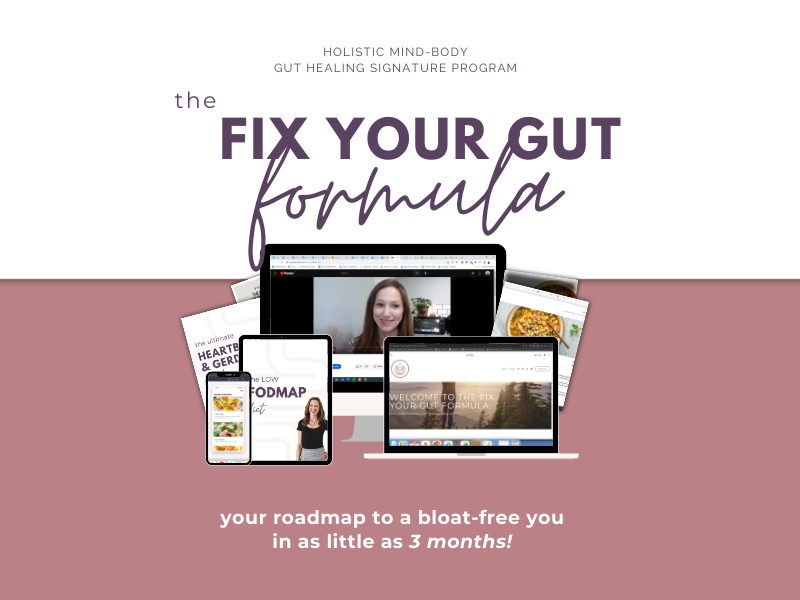PREVENTING INFECTIONS BY OPTIMIZING GUT HEALTH
If you’re like most of my clients, you seem to constantly get sick.
You always seem to be getting bladder infections, strep throat, sinus infections or food poisoning.
And you know antibiotics are bad for your gut, but you end up having to take them and then you feel even worse.
Did you know it takes about 6 months to recover from one course of antibiotics?
On top of that, after an antibiotic, because it wipes out your healthy gut bacteria that support your immune system, you’re more likely to get another infection - and ladies, you’re even more likely to get a yeast infection!
So why do you keep getting infections and what we can do about it?
Up to 70% of your immune system is in your gut.
Yes, SEVENTY PERCENT.
That means if you:
Live off processed foods
Skip meals
Don’t eat enough fruits and vegetables
Are frequently constipated
Rely on medications to function
Frequently take antibiotics
Are sedentary
Have a high stress lifestyle
Then you’re more prone to have an imbalance gut microbiome, which is called dysbiosis, and this puts you at risk of getting recurrent infections.
This is even more common in people who have any autoimmune conditions such as Celiac disease or Hashimoto’s as their immune system is too busy creating constant inflammation and attacking the body to be able to fight off infections.
Because we know that antibiotics are so damaging to the gut, we want to try to prevent infections as much as possible.
The best way to do that is by supporting a healthy gut microbiome.
Try these simple strategies to support your immune system and help prevent infections:
Increase the diversity in your diet:
like any ecosystem, diversity is key. The more diversity of foods and fibres you eat, the more it feeds a wide range of different types of healthy bacteria to support immune function.
Increase fibre:
fibre is food for your healthy gut bacteria. THe most important type is soluble fibre - the kind that dissolves in water. This is found in fruits and vegetables, beans and lentils and other whole grains. If fibre worsens your gut symptoms, let’s talk, you may need to kill off and balance gut bacteria before adding fibre to your diet. The goal is 30g of fibre per day, which can be hard to reach, and some people may want to try a fibre supplement.
Examples of fibres in food:
1 cup of beans or lentils: 18 g
1 cup of brown rice: 3.5 g
1 piece of whole grain bread: 2 to 3g
1 cup of broccoli: 2.5g
½ an avocado: 5 g
1 apple: 4g
Eat fermented foods:
yogourt, sauerkraut and kimchi (must be true ferments that are sold from the fridge, cloudy on the bottom with no vinegar added)
Manage stress:
stress promotes the growth of unhealthy gut bacteria and prevents healthy gut bacteria from growing. Stress is unavoidable, but try adding practices to your day to help you manage stress such as time in nature, exercise, meditation, deep breathing
Get your sleep:
lack of sleep lowers immunity, increases the stress response and promotes cravings for unhealthy foods
Eat to balance your blood sugar:
Your blood sugar is the level of sugars in your blood at any given time.
Your body uses this sugar to make energy. Everything you eat is eventually broken down into sugars to be used by your cells to make energy for your body.
But the rate at which it’s broken down and enters your bloodstream is different, depending on the food and which foods you eat together.
If you skip meals or eat meals high in carbs without much protein, fat or fibre you’re going to have imbalanced blood sugar. This can feel like energy spikes and crashes throughout the day and can cause brain fog, mood changes, jitters and trouble concentrating.
Imbalanced blood sugar keeps your body stuck in survival mode, and chronically high blood sugar promotes the growth of bacteria that can lead to infections.
Eating to balance your blood sugar means:
eating when you’re hungry: about every 3 to 4 hours
eating a combination of protein + fat+ fibre at every meal and snack
Increase antioxidant rich foods:
antioxidants are food for healthy gut bacteria. In general, high antioxidant foods are either very bright, or very dark. Try adding more berries, cherries, leafy greens, green tea, dark chocolate, cloves and cinnamon and orange fruits and vegetables into your diet.
Eat less processed foods and sugars:
processed foods tend to be high in chemicals and preservatives that impact gut bacteria, low in fibre and nutrients and promote constipation and inflammation in the gut. Sugars feed inflammatory bacteria and yeasts. You should allow yourself a treat once in a while, but try to cook most of your foods from scratch and keep sweets as an occasional treat.
Should you take a probiotic to boost your immune system?
Probiotics have been proven to help with digestive health concerns and to support immunity as well, however, the wrong probioitc at the wrong time can make your gut symptoms worse.
Probiotics with the most evidence for immune support:
Saccharomyces boulardii - a probiotic yeast
Lactobacillus rhamnosus, LGG®,
Lactobacillus paracasei, L. CASEI 431®
Bifidobacterium, BB-12
Remember, no single supplement will be enough to boost your immune system if you aren’t also eating well, managing stress and getting your sleep. It takes a whole body mind and lifestyle approach.
What about immune boosting supplements like vitamin C or echinacea?
While having optimal vitamin levels can certaintly support your immune system, taking vitamin C or echincea won’t be enough to prevent or fight an infection if you aren’t also eating well and addressing your lifestyle.
There is evidence to support both the use of vitamin C and echinacea, but it’s always best to speak to your practitioner to see if these supplements are right for you. For example, if you have an autoimmune condition, echinacea can further stimulate the immune system and cause a flare up of symptoms. Many herbs like echincea can also interact with medications.
Balancing Your Gut Bacteria To Optimize Immune Function
While diet is important, sometimes we need to use targeted supplementation to balance the gut microbiome.
Many people with chronic gut issues have some form of dysbiosis which can include:
SIBO/LIFO: small intestine bacterial overgrowth and/or fungal overgrowth
LIBO/LIFO: large intestine bacterial overgrowth and/or fungal overgrowth
H. pylori: a stomach infection that can cause gastritis and ulcers
chronic/latent infections: this can include bacterial infections from food poisoning, viral infections such as Epstein Bar (EBV aka “mono”) and herpes.
insufficiency dysbiosis: too little healthy bacteria - often linked to antibiotics and long term poor or restrictive diets
I use a 4R protocol used in functional medicine to address gut microbiome imbalances.
In reality, many of these phases overlap each other, and sometimes the order in which we do the phases is changed, depending on the client’s needs.
For example, if you just took several rounds of antibiotics, we would skip the “remove” aka “killing” phase, and focus more on microbiome restoration and repairing leaky gut.
Remove
In this phase we remove microbes actively causing inflammation such as overgrown bacteria or yeasts, infections, H. pylori etc. This is done with specific antmicrobial supplements that are chosen based on the persons symptom profile (or if we have a stool test - the results of the test).
People prone to constipation: often have species that produce methane and other microbes which are often treated with a combination of garlic, berberine containing herbs and carminative herbs such as oregano.
People prone to diarrhea: often have bacteria that produce hydrogen, which is more often treated with carminative herbs such as oregano, sage, clove, lemon balm.
Some people may also have biofilms that trap bacteria and other microbes inside, making them harder to kill. We address biofilms with biofilm busting supplements including black cumin, serratiopeptidase, NAC and bismuth.
Probiotics can also be used during this phase to crowd out the bad bacteria and modulate the inflammatory and immune response. Probiotics should be avoided if SIBO is suspected, which is common in those with upper GI symptoms such as heartburn and reflux/GERD or LPR.
In this phase we also remove inflammatory foods that are causing symptoms such as gluten and dairy, or other known food sensitivities.
I also encourage clients to remove over the counter medications such as painkillers, antacids and antihistamines as they can damage the gut lining, promoting leaky gut and also cause constipation and bacterial imbalances.
It can be hard to discontinue a medication you were relying on to function day to day, which is why I support my clients by offering natural options for common ailments such as allergies.
Replace
Replace things required for optimal digestion: many people with chronic gut issues have low stomach acid, digestive enzymes and bile. These can be supplemented to improve digestion, while we work on the underlying reasons for why they’re low.
Nutrient deficiencies: many people with gut issues have nutrient deficiencies due to poor diet or poor absorption. This can impact mood, energy and immunity - which impacts your body’s ability to heal. Common deficiencies include B vitamins, iron, calcium, magnesium and vitamin D.
Repair
Repair leaky gut and gut inflammation caused by poor diet, medications or inflammatory gut microbes. This is done with specific supplements including:
l-glutamine: an amino acid that repairs gut cells (the endothelium in the gut lining)
demulcent herbs: herbs that soothe and coat the gut lining to allow it to heal and provide symptom relief. These include deglychirrized licorice, slippery elm, marshmallow root
probiotics: specific probiotic strains have been proven to help heal leaky gut including Lactobacillus salivarius UCC118
2-fucosyl-lactose
zinc-l-carnosine
anti-inflammatory supplements such as curcumin, cat’s claw, bromelain, quercetin.
In this phase, we focus on foods that help heal the gut including easy to digest proteins, well cooked vegetables, omega 3 rich foods (salmon, olives, olive oil, nuts and seeds).
Restore
In this phase we restore balance to the gut microbiome using probiotics and prebiotics as well as other supportive nutrients.
Probiotics are a temporary measure as they don’t permanently colonize the gut. Most probiotics last about 4 to 6 weeks in the gut.
This is where the importance of fibre intake long term comes in. Fibre and antioxidants help you grow your own, permanent healthy gut bacteria.
During this phase we try to reintroduce foods that previously caused symptoms including gluten and dairy and other high FODMAP foods like onion and garlic. Most people tolerate these foods much better.
If you’ve tried many of these strategies and you’re also someone who struggles with chronic gut issues, infections and maybe also autoimmunity, you may need a more personalized approach and a systemic approach to balancing your gut microbiome - a 4R protocol.
Overwhelmed and not sure where to start?
THE FIX YOUR GUT FORMULA IS YOUR GUT HEALING ROADMAP!
BANISH BLOATING, BOOST YOUR ENERGY ADN CONFIDENCE AND GET YOUR BODY BACK IN AS LITTLE AS 3 MONTHS WITH MY PROVEN SIGNATURE PROGRAM!
NEW PRICING! ONLY $39.95/MO!

